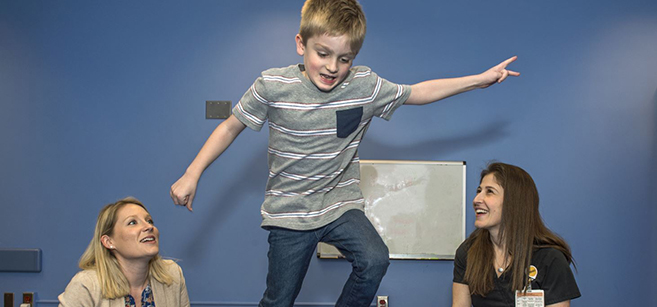Speech/language skills: birth to 2 years
Speech and language skills: Birth to 2 years
It's important for parents to help their children develop speech and language skills at a young age so that their children will be able to use speech/language to communicate.
Speech means making the sounds that make words. Speech issues include difficulties in the pronunciation of sounds (articulation), stuttering, or physical problems with a child's mouth that interfere with talking and eating.
Language means using words and sentences to express wants, needs or ideas. Language development relates to the understanding of spoken information (such as following directions or understanding concepts, like “big and little”) and expression/talking (such as using sentences, asking questions and telling stories).
Language development follows a predictable pattern that may be reached within a range of months. Adequate language development depends upon physical, motor, sensory, cognitive and social growth during the first 6 years of age. Cognitive development relates to the development of mental processes such as thinking, remembering and reasoning. These skills lay the foundation for language, social, self-help and motor skills.
Here are general guidelines for speech/language development for children ages 0 to 2 years.
Newborn to 3 months
- Listens and responds to voice and other sounds
- Tells feelings by cooing, gurgling, smiling and crying
- Vowels will predominate, but they will begin to vocalize with 2 syllables
- Cognitively, the child will begin exploratory play by mouthing and touching objects; will begin to watch speaker's eyes and mouth
4-6 months
- Turns to your voice and other sounds
- Begins to respond to own name
- Laughs or squeaks; babbles a series of syllables
- Varies volume, rate and pitch by playing with sounds
- Cognitively, the child begins to play; visually follows a vanishing object; inspects objects; reaches to grab a dropped object
7-12 months
- Recognizes family members, pays attention to music or singing, looks at named pictures with an adult
- Obeys some commands, especially if accompanied by visual cues (e.g., bye-bye), begins two syllable sentence-like jargon
- By 12 months, may speak one or more words
- Cognitively, the child will use trial and error approach to attain a goal; increases imitation; uses common objects appropriately
12-18 months
- By 18 months, produces/uses approximately 15 meaningful words
- Asks for “more,” points to pictures in a book
- Cognitively, gives a toy if asked; removes lid of a box to find a hidden toy; explores environment; imitates several new gestures
18-24 months
- Likes rhyming games; pulls a person to show them something; uses “I” and “mine,” names most common objects
- Uses short incomplete sentences (e.g., “want juice”, “ car go.”)
- By 24 months, the child may understand (but not necessarily use) 200-300 words
- Cognitively, knows shapes; sits alone for short periods with books; matches familiar objects; comprehends one and many; points to body parts
What if I am concerned about my child's speech and language skill development?
This information is a general guide to help you determine if your child is progressing at the rate expected for his or her age. Please keep in mind that each child is unique and develops skills at their own rate. If you are concerned about your child's development, a physician or therapist may be able to assist with an evaluation.
To make an appointment with a pediatric therapist, call one of these locations:
- Bon Air Therapy Center 804-323-9060
- Brook Road Campus 804-228-5818
- Fredericksburg Therapy Center 540-891-4485
- Glen Allen Therapy Center 804-273-6656
- Petersburg Therapy Center 804-733-7233
- Stafford Therapy Center 540- 659-7337
Note: Speech and Language Pathology addresses problems related to speech and language development.
Information provided by Madeline Bryan, MEd, CCC/SLP, Speech /Language Pathologist, and Barbara Lent, MEd, CCC/SLP, Therapy Team Leader.

